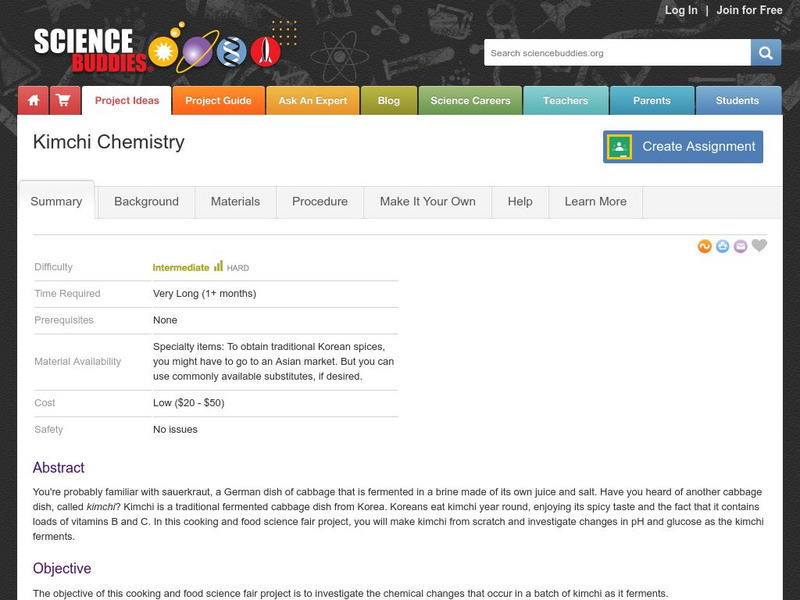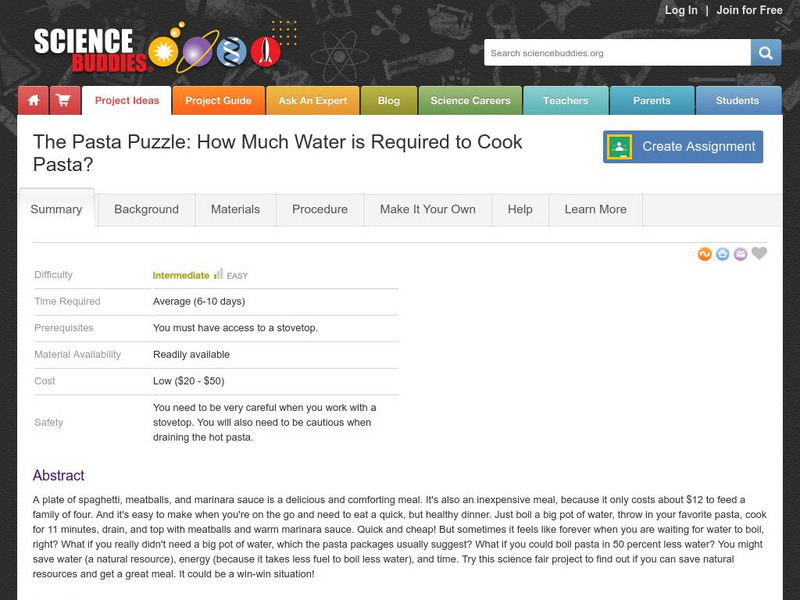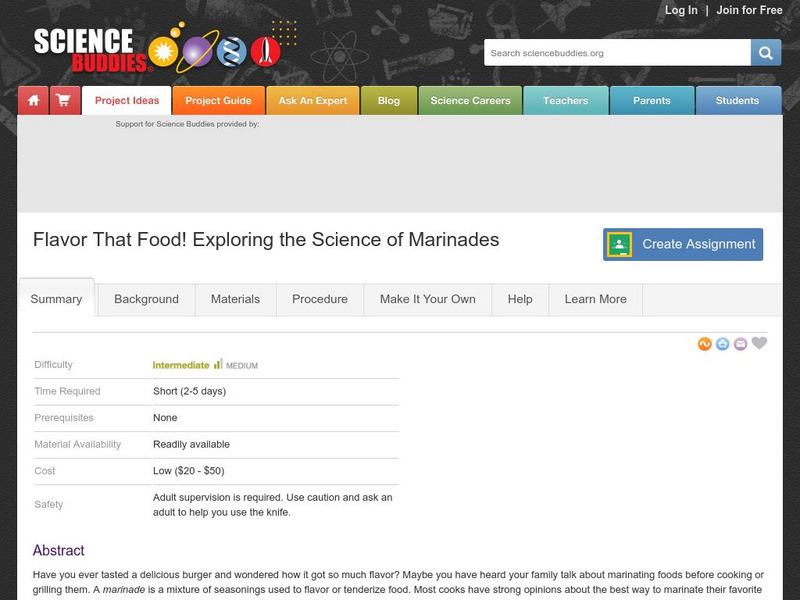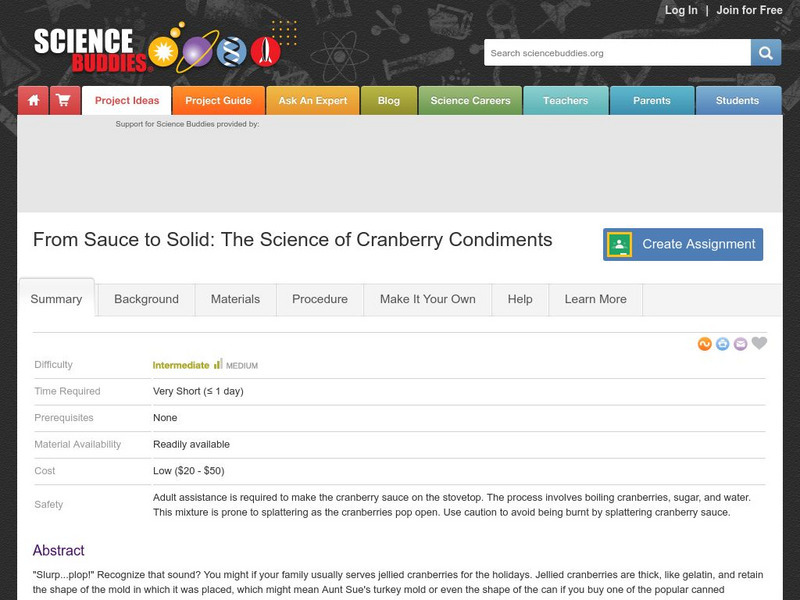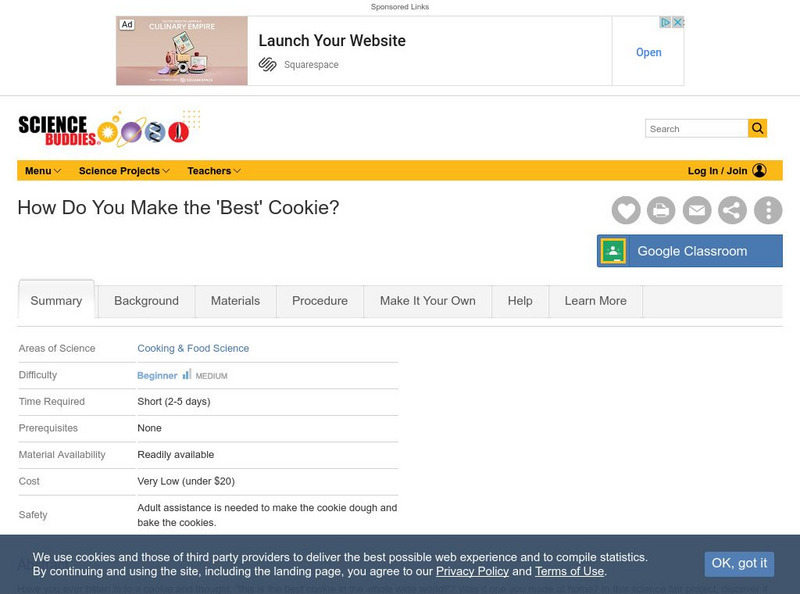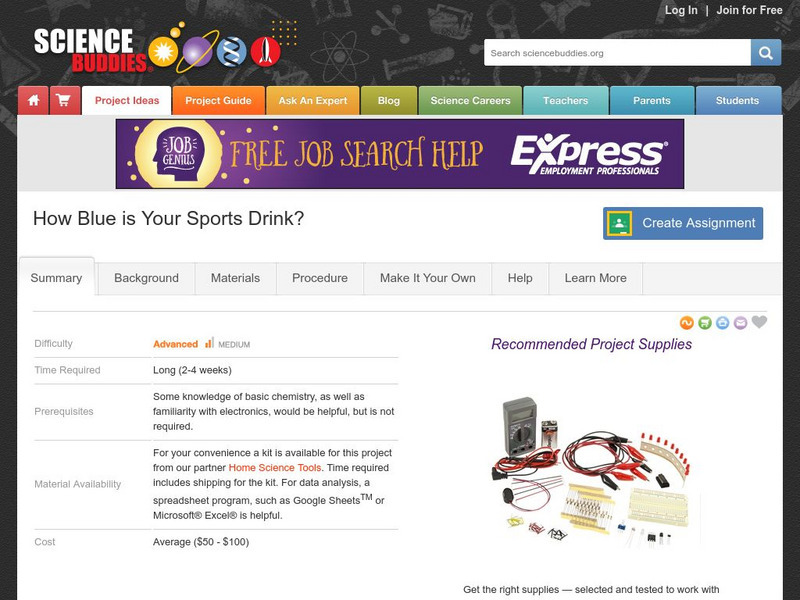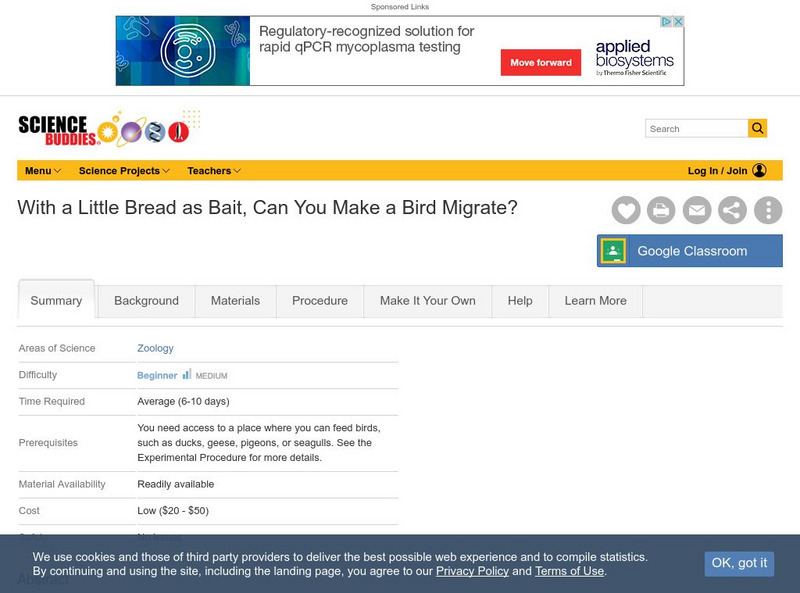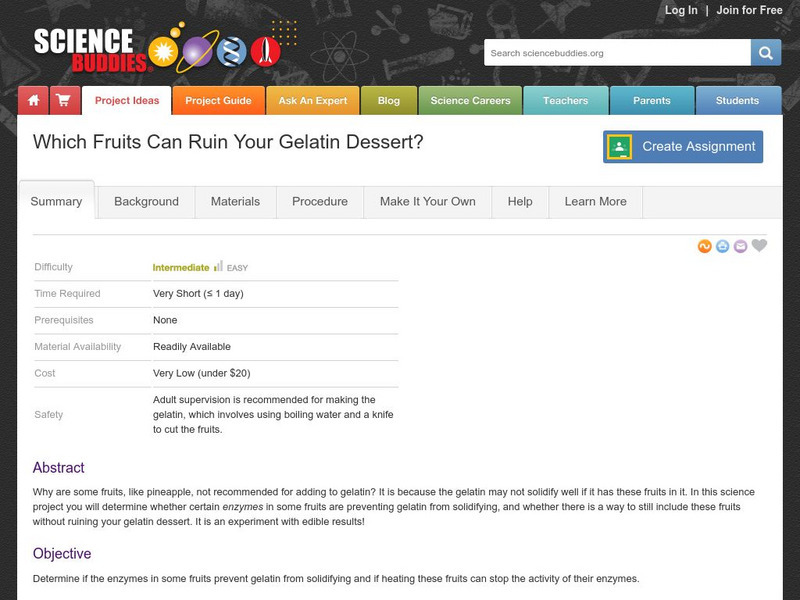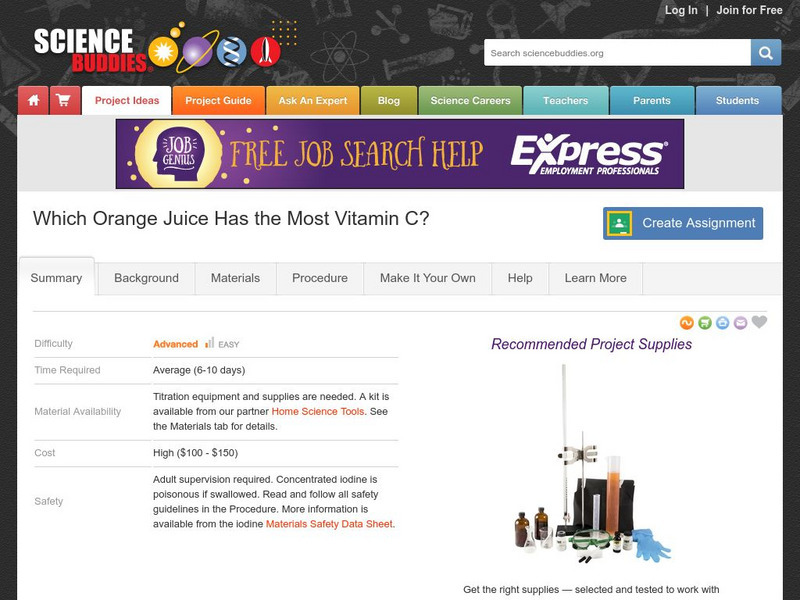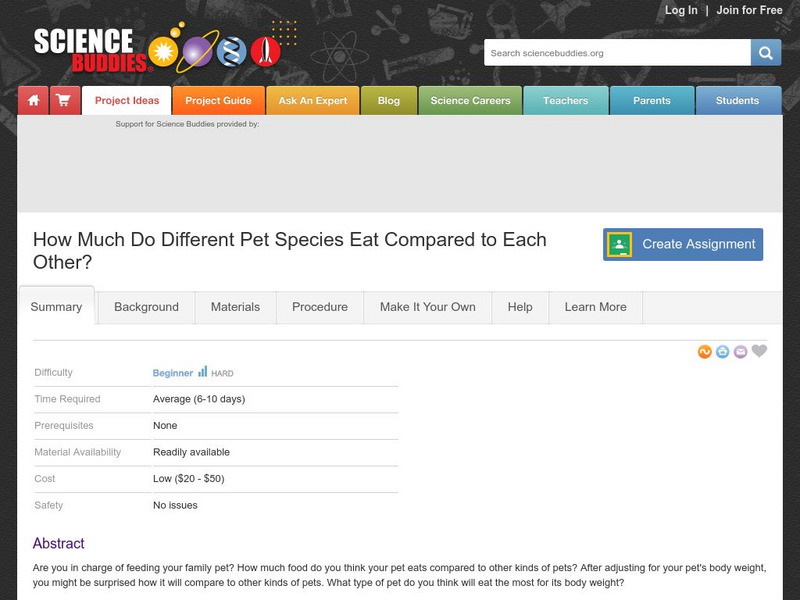Science Buddies
Science Buddies: Project Ideas: Understanding How Food Becomes Rancid
In this cooking and food science fair project, the student will determine how light and air can oxidize fat in potato chips and cause the chips to go rancid. The Science Buddies project ideas are set up consistently beginning with an...
Science Buddies
Science Buddies: Project Ideas: Kimchi Chemistry
In this cooking and food science fair project, the student will make a batch of kimchi, the national dish of Korea, and investigate the changes in pH and glucose concentration as it ferments. The Science Buddies project ideas are set up...
Science Buddies
Science Buddies: Project Ideas: Perfecting Pastries: Role of Fats
In this cooking and food science fair project the student will investigate the effect that fat and its temperature have on the taste and texture of pastry shells. The Science Buddies project ideas are set up consistently beginning with...
Science Buddies
Science Buddies: Project Ideas: How Much Water Is Required to Cook Pasta?
In this cooking and food science fair project, determine if you really need 6 quarts of water to cook a pound of pasta. The Science Buddies project ideas are set up consistently beginning with an abstract, objective, and introduction,...
Science Buddies
Science Buddies: Flavor That Food! Exploring the Science of Marinades
Have you ever tasted a delicious burger and wondered how it got so much flavor? Maybe you've heard your family talk about marinating foods before cooking or grilling them. A marinade is a mixture of seasonings used to flavor or tenderize...
Science Buddies
Science Buddies: Egg Cellently Cooked Eggs: The Process of Soft Boiling an Egg
Sometimes on a busy day, it's hard to get things done. The rush to get things done can start first thing in the morning, when you're so busy getting ready and gathering your homework, that you barely have time for breakfast. It takes...
Science Buddies
Science Buddies: Project Ideas: Simple Device to Measure the Strength of Tea
In this science fair project, measure the strength of tea, using plastic cups, a photoresistor, and a multimeter. The Science Buddies project ideas are set up consistently beginning with an abstract, objective, and introduction, followed...
Science Buddies
Science Buddies: Project Ideas: Bitter to Sweet: Sugar Changes in Ripening Fruit
In this science fair project, use a refractometer to measure changes in sugar content in ripening fruit. The Science Buddies project ideas are set up consistently beginning with an abstract, objective, and introduction, followed by a...
Science Buddies
Science Buddies: Project Ideas: Processed Cheese
The goal of this cooking and food science fair project is to understand how processed cheese is made, and to determine which percentage of emulsifying salt produces the best processed cheese. The Science Buddies project ideas are set up...
Science Buddies
Science Buddies: The Science of Making Cheese!
Oooey gooey cheese - yum. Who doesn't like a slice of warm pizza straight from the oven? There's nothing quite like a slice of pizza and a glass of milk, so what makes pizza so great? The cheese. But did you know that making cheese is...
Science Buddies
Science Buddies: How Greasy Are Your Potato Chips?
One of America's favorite snacks is potato chips. Although potato chips are very tasty, some varieties are not very healthy for you. A typical 1-ounce (oz.) serving of a well-known national potato chip brand contains 150 calories, 90 of...
Science Buddies
Science Buddies: Project Ideas: Sauce to Solid: Science of Cranberry Condiments
Determine how the cooking time of cranberry sauce affects its ability to form a pectin-supported solid. The Science Buddies project ideas are set up consistently beginning with an abstract, objective, and introduction, followed by a...
Science Buddies
Science Buddies: How Sweet It Is! Measuring Glucose in Your Food
You know that sugar makes food sweet. But did you know that there are different kinds of sugar? Sucrose is the granulated sugar that you usually use for baking. Another kind of sugar, which is found in honey and in many fruits, is...
Science Buddies
Science Buddies: How Do You Make the 'Best' Cookie?
The benefit to cooking food from scratch versus store bought food is that you determine the taste. In this science fair project, discover if you can perfect the taste of your favorite cookie right in your own kitchen by experimenting...
Science Buddies
Science Buddies: How Blue Is Your Sports Drink?
Do you read the list of ingredients in foods and drinks before you buy them at the grocery store? If you do, you may have noticed that many of the items that are blue in color have the same dye, called FD&C blue 1. In this chemistry...
Science Buddies
Science Buddies: How Sweet It Is: Hummingbird Food Preferences
Do you like to watch hummingbirds? Have you ever wondered why there is specialty hummingbird food? What is it about the food that makes it so appealing? In this zoology science fair project, you will observe these remarkable creatures...
Science Buddies
Science Buddies: Do You Love the Taste of Food? Find Out if You're a Supertaster
To supertasters, the flavors of foods are much stronger than to average tasters. This can explain why some people are more picky about their food than others, because they experiences tastes in a much stronger form. Find out if you are a...
Science Buddies
Science Buddies: With a Little Bread as Bait, Can You Make a Bird Migrate?
You might like to play in the autumn leaves and winter snow, but have you noticed that many birds don't like to stick around for the cold weather? And instead of the birds you're used to seeing in the warm months, your new feathered...
Science Buddies
Science Buddies: Cold Room? Heat It Up With a Homemade Solar Air Heater
Humans need food, water, and warm shelter to survive. But a lot of humans depend on fossil fuels to supply gas and electricity to heat our homes. But burning fossil fuels to create energy is harmful to the environment. In this science...
Science Buddies
Science Buddies: Got Iron? Measure the Concentration of Iron in Water
Iron is an important mineral essential for good health. Iron deficiency can be a problem. In this science fair project, use a simple iron test kit to measure the concentration of iron in water. This experiement is explained clearly and...
Science Buddies
Science Buddies: Which Fruits Can Ruin Your Dessert?
Here is a basic project for investigating enzymes that prevent gelatin from solidifying. This way you can understand why it is some fruits are not recommended for inclusion when it comes to making gelatin.
Science Buddies
Science Buddies: Which Orange Juice Has the Most Vitamin C?
In this project you'll learn how to measure the amount of vitamin C in a solution using an iodine titration method. You will hypothesize which juice will contain the most vitamin C, and then compare the amount of vitamin C in three...
Science Buddies
Science Buddies: How Much Do Different Pet Species Eat?
How much food do you think your pet eats compared to other kinds of pets? In this experiment you will compare the food intake of your family pets to find out which pet eats more for its body weight.
Science Buddies
Science Buddies: How Does Packaging Affect the Ripening of Fruit?
Why do different types of fruits come packaged in different ways? In this project, you will experiment with different ways of packaging fruit to see if it has an effect on the freshness of the fruit. Will a different kind of packaging...

